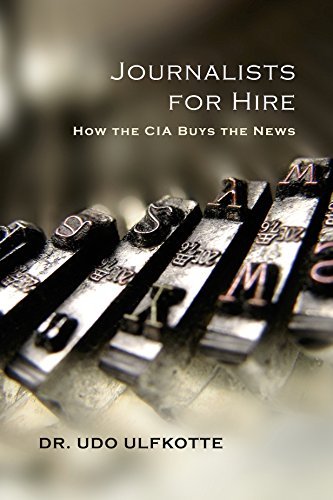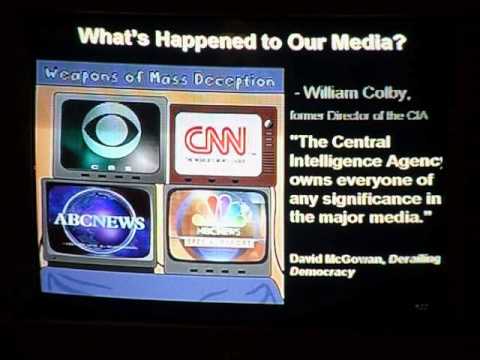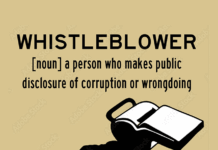
Ulfkotte’s political awakening about the corruption of the media industry came when he was sent to cover the Iran-Iraq War in the 1980s and was instructed to present Iraq as the good guys
A former editor for the German main daily newspaper, Frankfurter Allgemeine Zeitung (FAZ), Dr. Udo Ulfkotte became nationally renowned in dissident circles for his 2014 book Journalists for Hire: How the CIA Buys the News, originally published in German, which went through multiple translations.
The book relays Ulfkotte’s experience with how the CIA and German Intelligence (BND) bribe journalists to write articles free of truth and facts, and with a decidedly pro-Western, pro-NATO bent or, in other words, propaganda.

One of Ulfkotte’s formative professional experiences was as a war correspondent during the Iran-Iraq War (1980-1988), where the Iraqis were considered to be “the good guys”—because they were serving Western interests in confronting Iran, whose Islamic regime had toppled a long-standing U.S. client, the Shah, in a 1979 revolution.
Iraqi war crimes under Saddam Hussein were covered up along with Washington’s interests in trying to weaken and divide two aspiring Middle Eastern powers so the U.S. could dominate the region and exploit its oil resources.
When he first arrived in Baghdad, Ulfkotte was a little scared. He did not have any experience as a war correspondent. The Iraqi Army quickly sent him off to the front line; the bus was full of loud, experienced war correspondents from prestigious media such as BBC, and Udo was just a miserable rookie.
The first thing that struck him as odd was that everybody was carrying canisters with them. He got upset that very moment and he thought to himself: “Ooops, if the bus gets stuck far from the petrol station, all of them chip in by filling in some petrol into the engine so Udo decided that in the future he would have to carry a canister as well.”
They were on a bus for hours on end riding through the desert. At 20 to 30 kilometers from the border, there was literally nothing there. There was no war whatsoever. There were armed vehicles and tanks long since burned to ash. The reporters got off the bus and sprayed the contents of the canisters all over the vehicles. The Iraqi soldiers were there with them with the machine guns: “Imagine that, tanks in the desert, burned to ash a long time ago, set on fire only now. The clouds of smoke all around. And the reporters positioning their cameras.”

What he witnessed was flame and clouds of smoke behind them, and the Iraqis running around in front of the cameras all the time with machine guns in their arms and scowling military looks in their eyes. Udo mustered up courage and asked one reporter: “I understand. The photos are brilliant, but why do they keep stooping and ducking down?”
The man replied: “Simple. In the audio played in the background one could hear machine guns, and it will sound very good back home.”
Udo kept thinking all the way home. “Young man, you did not see a war at all. You were by the campfire. What are you going to write about?”
Yes, that is a problem for a rookie working for a news agency. Performances are mainly adapted to suit the media needs. It is necessary that one “fits in” with the other seasoned professionals and concoct stories out of thin air that those in positions of authority want the people to hear—not ones that actually exist.
When Udo got back to Baghdad, there were no mobile phones; they were waiting in the Rashid Hotel for hours at times for the international line. He first phoned his mother, not his employer. He was desperate. He did not know what to do. At that point his mother started crying over the phone: “My boy! You are alive!” Udo thought to himself: “What do you mean? Is everything all right? My dear boy! We thought….What is happening, Mother? We saw on TV what happened around you.”
The TV channel had already sent back the fake stories and he tried to calm his mother down, trying to explain that it did not happen the way she believed it did. She thought Udo lost his mind. Udo said in his book that he would finish there, because he was not there to tell us a satire. He only wanted to say that this was his first experience with the truth in journalism and war correspondence. Basically, he was utterly shocked with the first contact he made. But, unfortunately, that was not an isolated case.[1]
In Udo’s naïve mind, war was a place where a reporter could report on horrifying events and help the public to empathize with the victims of war and expose the hidden political machinations behind it.
Instead, he found himself forced to write fake stories from far away from the front lines and to manufacture propaganda to induce consent among the public.
The ones manufacturing the stories were associated with the intelligence agencies whose job it is to deceive the public.
By serving as a correspondent in the Middle East, Ulfkotte was able to meet agents from the CIA, British M16, the Israeli MOSSAD and the German intelligence agency Bundesnachrichtungendienst (BND).
His editors used to readily cooperate in such operations of collating intelligence information, which the reporters would dutifully transcribe for the public back home.
The skill of unofficial reporting is when a reporter essentially works for the CIA and he or she is not employed in an official role, Ulfkotte explains.
Both sides hugely benefit from their partnership and at the same time both sides can deny their relationship. The CIA would have found young reporters and they would then be their mentors. All of a sudden many doors would open for them, they would be granted awards and before they knew it, their mentors (read: paymasters) would have owned their whole careers.[2]

This is basically the name of the game. This is how it all works. Ulfkotte admitted with regret that he published articles in his own name that were actually written by CIA agents and other intelligence services, particularly the German secret services.
Ulfkotte went on to say that he had close contact with the German intelligence service, BND. Two persons from BND were regularly coming to the newspaper office where he worked. On occasion, he says, he was not only given the report but that the BND wrote the articles, which were published in the newspapers under Udo’s name.
Udo was asked by an interviewer if he could document what he was saying and he responded yes, that he could.

“I can say that this and that article with my text in the papers was written by the intelligence services because I couldn’t have possibly known what was written in it. I couldn’t have possibly known what was there in a cave in Libya, what secret thing in one particular place, what is being built there. That is what BND wanted to publish (using my name),” writes Udo.[3]
It was not like this only in FAZ. This was in other media as well.
“If we had rule of law, there would be an investigative committee to investigate dubious claims. Political parties would be outraged and rise [against the injustice of the fake news], regardless of whether they were the political left, the political right or the center and they would say: ‘What is this guy Ulfkotte saying? And he claims that he can document everything? This needs to be investigated.’”[4]
Udo continued: “This is still a common thing. I know some colleagues of mine who still maintain a close contact with the intelligence services. I would feel very good if there was an investigative committee but this obviously is not going to happen, because it is in nobody’s interest to do so. Because in that case the general public would understand to what extent politics, media and secret services are closely connected in this country.”[5] And in this world!

When Ulfkotte had a close encounter with his own conscience—and if one reads Dostoyevsky, they know that there is no person in the world who does not wrestle with their own moral dilemmas—he decided to elaborate on his experiences. In doing so, he provided significant insight into contemporary media and of the society that we live in.
Almost everybody knows but only a few dare speak about what Udo said.
He wrote: “I was in close contact with some European media or big private media companies—you cannot write or say what you feel like and what your views are necessarily. I can tell you that what I am saying here is what I have experienced everywhere. There are clear directives and everybody knows that one cannot publish what they want in the newspapers owned by Springer such as Bild or Welt—for instance the articles critical of Israel. There is no way you can do that there! You have signed an agreement that you will not challenge the question of the existence of a country of Israel or the Israeli point of view. These directives exist in all big media companies.”[6]
Ulfkotte continued: “If you do not wish to remain stuck in the lower corporate levels but you would rather travel with the chancellor, ministers, president or with the politicians, in the airplanes which belong to the government, in that case you have to adhere to certain rules. I have learnt that rather quickly.
What we consider as free journalism is a rather orderly and orchestrated thing to its every detail. But for your superiors, it is vitally important that that is not viewed as censorship and limiting of free reporting or whichever (bland and vague) terms and phrases they tend to use.
I soon realized that when I was tasked to accompany Helmut Kohl, the then German Chancellor, in my capacity of a journalist, you are not invited to do this job because your name is Udo Ulfkotte but because you work for Frankfurter Allgemeine Zeitung.”[7]

Udo went on to write:
“In such a case, one is expected to deliver a certain kind of reporting. Which one? Forget about my news agency. This is to do with all of them in general. At the outset of the journey, a reporter is given a set of directions as to what to ask, how to communicate. Normally, you are not told what to say and ask, to write something in this way or that way but you are painfully aware that if you do not do that in such and such a way, you will not be invited next time. Your media company will be called to tell them that you are not wanted. And then you are out!
Those in charge of the cooperation with the media are the non-government ‘think tanks,’ those foundations and organizations which arguably are ‘independent’ in the same way that independent journalists supposedly are.
I am often asked where are those people who ‘pull all the strings,’ so that everything is told in a similar way? Look at those people who sit in the huge transoceanic think-tanks and foundations, for instance, look at the foundation Atlantic Bridge, and in all such organizations. And how is one supposed to influence others there?
I know from personal experience. Let us not speak only theoretically. The German Marshall Fund invited me as their colleague to visit the USA for six weeks earlier on. All expenses paid. This think-tank had close contact with the CIA, and I gained easy access to all the U.S. politicians, to all of them I was eager to be in contact with.
Above all, they literally showered me with gifts.”[8]

The journalists and the news agencies which are supposed to be, if one follows the logic of their role in a democratic society and its laws and constitutions, and then code of ethics and professional conduct, to take care of general interests, find themselves facing a challenging situation—take something for yourself or give something from within yourself for something distant and uncertain. A human being cannot resist small things that the powers that be are able to provide for them profusely.
“Media is just a word that has come to mean bad journalism.” – Graham Greene
All that is the name of the game. When The German Marshall Fund took Ulfkotte to the U.S., they told him that they knew he took a diving course in Oman. The CIA knew with utmost precision. They even gave him diving equipment through his contact in Oman.
During these six weeks he got an invitation from the governor of Oklahoma. He went there. There was a small ceremony and he received honorary U.S. citizenship. He became an honorable citizen of the USA. It was written in his certificate that from then on he would only write nice things in his reports.
The English version of the book by Udo Ulfkotte, The Bought Journalists, i.e., Journalists for Hire: How the CIA Buys the News, appeared on May 15, 2017, but by it having been published, the whole story surrounding it was not over.
According to the research by Off Guardian, Tayen Lane Publishing has since removed all references for this book from its website. Amazon UK indicates that the title is currently unavailable, with the possibility of the purchase from independent distributors, which offer used copies for an exorbitant amount of a thousand U.S. dollars per copy.
At least a 2019 version of the book, Presstitutes Embedded in the Pay of the CIA: A Confession from the Profession is available for a reasonable price on amazon and goodreads.com at least in the U.S. Though you won’t find the book on display in Barnes & Noble or other big book shops as the powerful people who rule the world don’t want its content being widely read.
Regrettably, Udo Ulfkotte died of a heart attack at the age of 57 (Tracy, 2018).
After reading his books and writings, one wonders: “Is there anybody in the mainstream media who has not worked for the CIA?”
“In America, the president reigns for four years, and journalism governs forever and ever.” – Oscar Wilde.
Edward Snowden and Julian Assange are both world famous, with the former having much more luck by moving to Russia. Udo Ulfkotte, however, is almost completely out of the public gaze, although he was a journalist and whistleblower in the media industry, possibly as important as both.
One might think that this comes across as paradoxical. Yet it only means that the public does not recognize profound relations in the media industry.
Ulfkotte was a renowned European journalist with a Ph.D. in the social sciences and an immigration reform activist, among other things. When he wrote Gekaufte Journalisten: Wie Politiker, Geheimdienste und Hochfinanz Deutschlands Massenmedien lenken (the translation of its original title is Bought Journalists [alternatively, a translation of the title more to the point is Journalists for Hire]: How Politicians, Secret Services and High Finance Steer German’s Mass Media), he became one of the most significant whistleblowers in recent history.
James Tracy pointed out in Off Guardian that Ulfkotte showed how the Western secret services took over the central place in the Western journalism.” According to Tracey, Ulfkotte was able to witness all that with credibility and his personal and professional integrity because he was working in top echelons of the mainstream media profession for years.
Tracy added that the presence of the secret (intelligence) services is neither a chance encounter nor is it random. Their recruitment techniques are always similar in every corner of the globe.

-
Udo Ulfkotte, Journalists for Hire: How the CIA Buys the News (London: Tayen Lane Publishing, 2017). See also Slobodan Reljić, The Will to Lie: The New Disinformation World Order, https://catenamundi.rs/shop/volja-za-laz-slobodan-reljic/ ↑
-
James Tracy, “English Translation of Udo Ulfkotte’s ‘Bought Journalists’ Suppressed?” Off Guardian, January 18, 2018, https://off-guardian.org/2018/01/08/english-translation-of-udo-ulfkottes-bought-journalists-suppressed/. ↑
-
Ulfkotte, Journalists for Hire. ↑
-
Ulfkotte, Journalists for Hire. ↑
-
Ulfkotte, Journalists for Hire. ↑
-
Ulfkotte, Journalists for Hire. ↑
-
Ulfkotte, Journalists for Hire. ↑
-
Ulfkotte, Journalists For Hire. ↑
CovertAction Magazine is made possible by subscriptions, orders and donations from readers like you.
Blow the Whistle on U.S. Imperialism
Click the whistle and donate
When you donate to CovertAction Magazine, you are supporting investigative journalism. Your contributions go directly to supporting the development, production, editing, and dissemination of the Magazine.
CovertAction Magazine does not receive corporate or government sponsorship. Yet, we hold a steadfast commitment to providing compensation for writers, editorial and technical support. Your support helps facilitate this compensation as well as increase the caliber of this work.
Please make a donation by clicking on the donate logo above and enter the amount and your credit or debit card information.
CovertAction Institute, Inc. (CAI) is a 501(c)(3) non-profit organization and your gift is tax-deductible for federal income purposes. CAI’s tax-exempt ID number is 87-2461683.
We sincerely thank you for your support.
Disclaimer: The contents of this article are the sole responsibility of the author(s). CovertAction Institute, Inc. (CAI), including its Board of Directors (BD), Editorial Board (EB), Advisory Board (AB), staff, volunteers and its projects (including CovertAction Magazine) are not responsible for any inaccurate or incorrect statement in this article. This article also does not necessarily represent the views the BD, the EB, the AB, staff, volunteers, or any members of its projects.
Differing viewpoints: CAM publishes articles with differing viewpoints in an effort to nurture vibrant debate and thoughtful critical analysis. Feel free to comment on the articles in the comment section and/or send your letters to the Editors, which we will publish in the Letters column.
Copyrighted Material: This web site may contain copyrighted material the use of which has not always been specifically authorized by the copyright owner. As a not-for-profit charitable organization incorporated in the State of New York, we are making such material available in an effort to advance the understanding of humanity’s problems and hopefully to help find solutions for those problems. We believe this constitutes a ‘fair use’ of any such copyrighted material as provided for in section 107 of the US Copyright Law. You can read more about ‘fair use’ and US Copyright Law at the Legal Information Institute of Cornell Law School.
Republishing: CovertAction Magazine (CAM) grants permission to cross-post CAM articles on not-for-profit community internet sites as long as the source is acknowledged together with a hyperlink to the original CovertAction Magazine article. Also, kindly let us know at info@CovertActionMagazine.com. For publication of CAM articles in print or other forms including commercial internet sites, contact: info@CovertActionMagazine.com.
By using this site, you agree to these terms above.
About the Author
Olga Peterson is a writer and translator living in Serbia.











Please look into Targeted individuals, we are dropping like flies under Illegal surveillance and D.E.W weapons. Our communities need to work together for stronger support. The necessity to garner exposure under this suffocating program is dire!